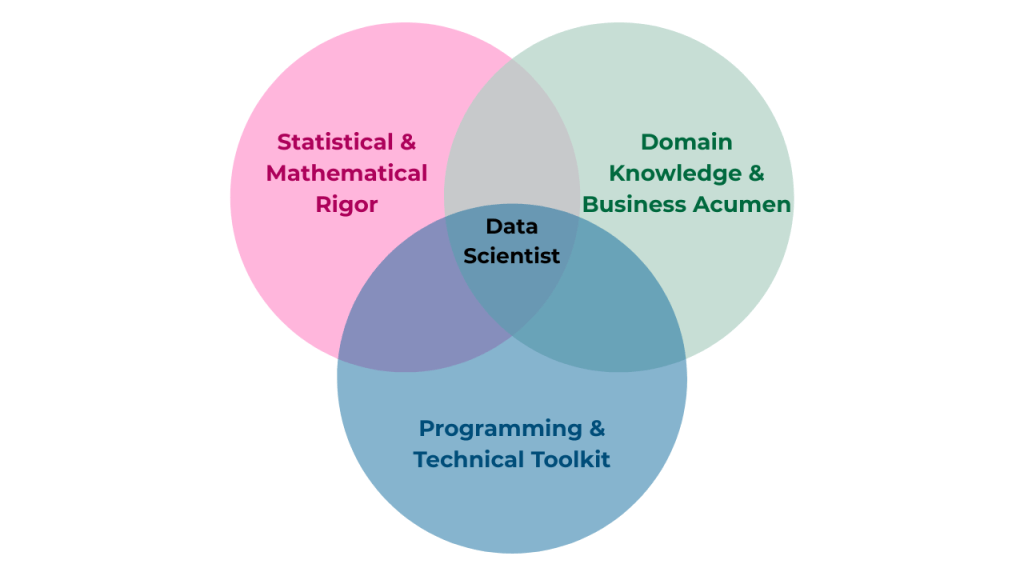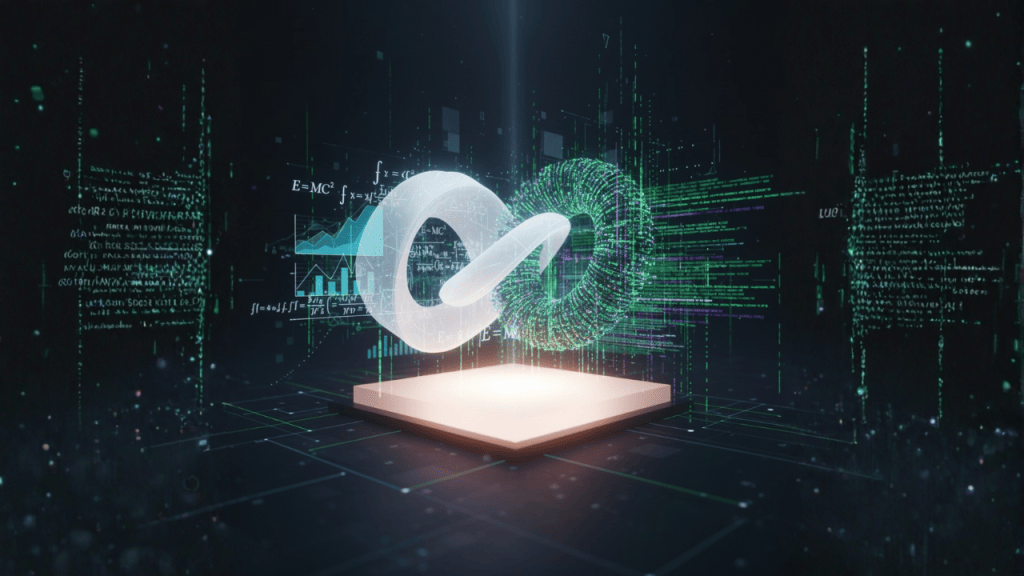
The job has changed fast, and the bar keeps rising. A modern data scientist blends the mindset of a statistician, the habits of a software builder, and the instincts of a savvy business thinker.
Why the shift now? Generative AI is maturing, companies want models to run in production, data volumes keep climbing, and leaders ask tougher questions about privacy and fairness.
The path forward in 2025 is simple to say and harder to do: build strong fundamentals, add a forward-looking toolkit, and grow the human skills that turn analysis into outcomes.

These are the bedrock skills that hold everything together. If you get them right, every project feels steadier and faster. The fundamentals matter even more now because bigger datasets and tougher use cases expose weak spots right away.
A strong data scientist works with probability, statistics, linear algebra, and a bit of calculus, not as trivia but as everyday tools. You should feel comfortable choosing the right test, reading distributions, and spotting when an assumption breaks.
Regression is more than a buzzword here…it includes linear, logistic, and regularized approaches, along with the judgment to know which one fits the problem. The same goes for A/B testing, where power, sample size, and clean guardrails keep you from fooling yourself.
This foundation is the “science” in data science, the part that protects data quality, validates models, and supports results you can trust.
Python and SQL are non-negotiable. In Python, Pandas, NumPy, and Scikit-learn let you move from raw files to features and then to models without getting stuck. SQL gives you reliable joins, window functions, and queries that scale beyond a single notebook.
R remains a strong plus, especially for statistical workflows and teams that rely on it. Most of the job lives in data prep, often 60 to 80 percent of your time, where you clean, reshape, de duplicate, handle missing values, and engineer features.
That effort is not busywork. It sets the floor for model performance because even a clever algorithm cannot fix broken inputs.

This set of skills reflects where the field is moving. Fundamentals get you started, but mastering the modern toolkit will make you stand out and deliver real impact. These are the capabilities that separate a strong candidate from a top hire.
Being able to deploy, monitor, and scale models is now a baseline expectation. It goes beyond building a model that works in a notebook. You need to know how to package models, create CI/CD pipelines, and containerize environments with Docker so others can run your work reliably.
Familiarity with big data platforms like Spark and Hadoop adds another layer of value, especially for projects that demand speed and scale. Real-time data handling with tools such as Apache Kafka is also becoming standard since many businesses rely on instant insights and automated decisions.
Companies want models that perform in live environments, and this ability connects research directly to measurable outcomes.

Deep learning has matured, and what matters now is practical application. You’ll be expected to work with pre-trained models, fine-tune them for your data, and build pipelines that actually serve users.
Prompt engineering for large language models is another skill that keeps popping up, as is the ability to evaluate these models in realistic conditions. Understanding transformer architectures and when to apply reinforcement or transfer learning gives you an edge.
Frameworks like PyTorch and TensorFlow are still the backbone, so being fluent in at least one is non-negotiable. Generative AI is no longer experimental…it’s shaping products across industries, and data scientists need to show they can build with it responsibly.
Modern data science lives in the cloud. AWS, Azure, and GCP each provide tools that make it easier to store, train, and deploy models at scale.
A data scientist should know how to use services like S3 or BigQuery for data storage, EC2 for compute power, and managed ML platforms like SageMaker or Azure ML for production workflows.
It’s also important to understand the basics of permissions, cost management, and scaling workloads. Cloud fluency makes collaboration smoother and keeps teams efficient. Without it, projects hit bottlenecks as soon as they need to grow.

Technical skills might get you through the door, but they’re not enough to keep you at the table. The difference between a good data scientist and one who shapes decisions lies in communication, judgment, and teamwork. These skills turn analysis into impact and make others trust your work.
Numbers don’t speak for themselves. The ability to turn complex analysis into a story that decision-makers can follow is one of the most valuable skills you can bring.
Strong data storytelling means you explain not only what happened, but also why it matters and what action should follow.
Tools like Tableau and Power BI help create dashboards that a non-technical audience can interact with, while Python libraries such as Matplotlib and Seaborn let you design tailored charts and plots.
When done right, storytelling moves your work out of a technical silo and into the hands of people who make choices for the business. Without this step, even the best analysis risks being ignored.
The most effective data scientists don’t just run models…they understand the context in which those models live. Developing knowledge of a particular industry, whether it’s healthcare, finance, retail, or another field, helps you frame problems in a way that matters to decision-makers.
Problem framing is at the heart of this skill: take a broad request like “improve customer retention” and translate it into something measurable, such as predicting which users are at high risk of leaving next quarter.
When you combine technical ability with domain understanding, you stop being the person who only provides numbers and become the person who helps shape strategy.
With AI influencing decisions that touch lives and livelihoods, ethical responsibility is not optional. You need to understand fairness, bias, transparency, and the rules that govern data use.
That means knowing how to evaluate models using metrics such as precision, recall, or calibration, while also testing for unequal impacts across different groups. Explainable AI techniques like SHAP values or feature importance are part of the toolkit, helping both regulators and stakeholders understand how decisions are made.
Building responsibly isn’t just a matter of compliance…it protects users, safeguards trust, and strengthens the reputation of the team delivering the models.
No project happens in isolation. A strong data scientist questions assumptions, breaks down problems into manageable steps, and collaborates with engineers, product managers, analysts, and leaders across departments.
Curiosity drives you to test new ideas and improve old ones, while structured problem-solving ensures you don’t get lost in the noise. Equally important is the habit of learning continuously since tools and methods shift quickly.
Data science is a team effort, and its half-life is short. To stay effective, you need to think critically, work well with others, and keep your skills sharp year after year.
Success in 2025 rests on three layers: strong fundamentals, a modern technical toolkit, and the human skills that turn analysis into decisions.
Think like a T-shaped professional…build depth in one or two areas while keeping a broad base across the rest. This isn’t an overwhelming checklist but a chance to grow into a role where your work shapes outcomes, builds trust, and creates impact.